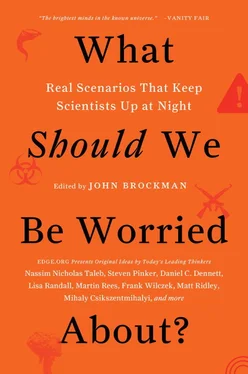The sixth component, also amplified by technology, is the public desire for freedom—of speech, the press, information, academic discourse, and all the other freedoms guaranteed by a proper democracy. These, as well as other human rights, are indeed the pillars of democracy. But when carried to unacceptable extremes they may lead to grave distortions: Incitement for murder or genocide is allowed; pedophilia is acceptable; disclosure of life-endangering national security information is fashionable; equal time for creationism and evolution is demanded; protecting terrorists’ and murderers’ rights is advocated more vigorously than defending victims’ rights. Numerous other outlandish situations never meant to be covered by basic human rights emerge. Although technology itself has not created these situations, the brevity of messages and their fast and wide dissemination, together with the ability to transmit all of the above across borders from backward dictatorships into democracies, turn our sacred human rights and civil freedoms into double-edged swords.
Finally, the seventh pillar of the sad mismatch between modern technology and democracy is globalization. Political boundaries may define a state, a country, or a continent. But every political unit must have a certain set of rules. Country A can be an exemplary democracy and country B a dark dictatorship. If there is very little cross-talk between their societies, both regimes may survive and live by their own rules. Globalization helps to spread progressive ideas into dark political corners, but if in Germany the denial of the holocaust is a criminal offense, and a satellite transmission from Iran can reach directly every house in Germany, we have a new situation. If modern technology allows fast and efficient money laundering, performed by numerous international banks almost at the speed of light, we have a new challenge. If the world tries to make international decisions and treaties by majority votes of countries most of which have never experienced anything remotely similar to democracy, it enforces global antidemocratic standards. We also observe an enhancement of illegal immigration patterns, cross-boundary racist incitement, international tax evasion, drug trafficking, child labor in one region producing goods for another region that forbids it, and numerous phenomena amplified by the fast mobility and modern communication offered by today’s technology.
To be sure, all of these seven points have been with us for years. We have often had short-sighted leaders, complained about superficial TV coverage of complex issues, observed scientifically illiterate leaders moving blindly in a labyrinth of technical issues, elected inexperienced good-looking politicians, demanded a reasonable level of transparency, exaggerated the application of honored constitutional principles, and believed in connecting with other nations on our planet. But modern technology has changed the patterns of all of these and amplified a dangerous lack of balance between our ideals and today’s reality.
As someone who believes in the enormous positive contribution of science and technology for our health, food, education, protection, and understanding of the universe, I am in great pain when I observe these features, and I believe we should be truly worried. The only way to cope with the problem is to allow the structure of modern liberal democracy to evolve and adapt to the new technologies. That has not begun to happen. We do not yet have solutions and remedies, but there must be ways to preserve the basic features of democracy while fine-tuning its detailed rules and patterns so as to minimize the ill effects and allow modern science and technology to do more good than harm.
BRUCE PARKER
Visiting professor, Center for Maritime Systems, Stevens Institute of Technology; author, The Power of the Sea: Tsunamis, Storm Surges, Rogue Waves, and Our Quest to Predict Disasters
If Edge is the Third Culture (scientists and other thinkers communicating new ideas about the world directly to the general public), and if the rest of the scientists and the so-called literary intellectuals are the first two cultures, as proposed by C.P. Snow, then there is also another culture whose impact is growing fast enough that it can justifiably be called the Fourth Culture. This “culture” is not really new.
In the past, we would simply have called it Popular Culture and then dismissed it as a world of mostly superficial entertainment with only a certain segment of the population caught up in it (that segment not considered intellectual or influential). But now this Popular Culture is Internet-driven and global and as a result has become pervasive, and its growing influence does not allow us to dismiss it so easily.
The Internet (and its associated media/communication entities, especially cell phones and cable TV) empower the Fourth Culture. And that culture is no longer concerned only with pop music, movies, TV, and video games. It now includes religion and politics and almost everything that touches people in everyday life. It is a bottom-up “culture” with a dumbing-down effect that is likely to have repercussions.
We should be worrying about a growing dominance by the Fourth Culture and how it may directly or indirectly affect us all. Because of its communication capabilities and its appeal to people’s egos, their sexuality, prejudices, faith, dreams, and fears, the Fourth Culture can easily shape the thoughts of millions. It promotes emotion over logic, self-centeredness over open-mindedness, and entertainment value and money-making ability over truth and understanding. And for the most part it ignores science.
The primary use of the Internet is still for entertainment, but that alone is a matter of concern. As more and more of the population fills more and more hours of the day with entertainment, this leaves fewer hours for activities that promote intelligence, compassion, or interest in anything that falls outside their own Internet-dominated microcosms. When one’s “accomplishments” in life and self-image become focused on things like scoring the most kills in a video war game or being able to see one’s favorite rock star in person or having one’s favorite sports team win a game (all possible before the Internet but now carried to much greater extremes), what passion is left for the real world, for a job, or for the problems of fellow human beings? Would it be taking the point too far to suggest a parallel with the Romans, who kept the masses distracted from real-world problems by enticing them into the Colosseum to watch such spectacles as gladiators battling to the death?
The Fourth Culture is probably not a threat to science; too much money is being made from science (and its resulting technology) for science to disappear. We are not trying to improve the science and math scores of our students so we can produce more scientists. There will always be those children born with the boundless curiosity about how the world works that leads them into science or some other analytical type of work. The reason we want to do a better job of educating our children in science is to make them better citizens. Our citizens need to see the world and its problems through the eyes of science. They must be able to recognize logical approaches to problem solving and not be blinded by religious views, myths, or bogus fears promoted by opponents to a particular course of action.
Nowhere does the Fourth Culture cause more concern than in how it affects whom we select as our leaders, using a now-handicapped democratic system. How the products/results of science are used is now often in the hands of decision makers who do not understand science. Some of them think science is bad and that carefully studied and proved theories are no different than religious dogma.
Читать дальше












